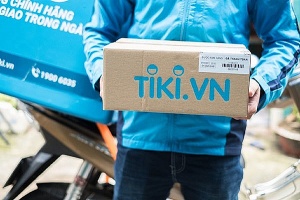Tiki diversification still to latch onto sustained success
According to Tiki Global – an entity founded in Singapore in order to support the platform’s fundraising efforts – Tiki saw a 7 per cent drop in its total revenue in the 2022 fiscal year, while its total expenses surged 4 per cent on-year, leading to a 39 per cent jump in the company’s operating losses compared to the previous fiscal year.
Tiki is currently operating business-to-business (B2B) and business-to-consumer (B2C) models. Its revenue stream comprises product sales and services provision, in which the former part accounted for 88 per cent of the company’s total revenues in the 2022 fiscal year.
 |
| Tiki diversification still to latch onto sustained success |
As for services provision, logistics is the field generating the most revenue for Tiki, with a 7 per cent jump on-year. The company has also made strong investments in bolstering logistics capacity and infrastructure.
Of note, the revenue associated with fee collection from transaction space leasing shed 37 per cent on-year, while the segment eyeing most robust growth during the period was Tiki Ads with a 131 per cent jump in revenue compared to the 2021 fiscal year. This segment, however, just constituted 2 per cent of Tiki’s total revenue.
In recent years, the platform has tried to diversify its services offering. For instance, in 2017 the company launched Tiki Now, which guaranteed product delivery within two hours. The initiative failed due to the low number of high-end users to enable the company to maintain such a costly service.
In May 2020, a fresh food segment called Tiki Ngon was launched, but this initiative was also reported to be burning cash with poor outcomes.
In the face of stiff competition among businesses on an equal footing such as Shopee, Lazada, and Sendo, Tiki has yet to generate profits. According to annual reports from VNG, a Tiki’s shareholder, in 2016 Tiki counted losses reaching $7.73 million, increasing to $12.2 million in 2017, and as much as $32.8 million in 2018.
In 2019, Tiki losses soared to $76.7 million, before unexpectedly falling to just $165,200 in 2020.
Some industry insiders believe that Tiki should follow the model used by AWS in order to embrace cloud computing services trading, on the assumption that cloud computing is a top-profit segment that could help Tiki reduce its reliance on venture capital.
AWS launched its cloud computing business in 2006 and it was deemed a game-changer to the company’s development.
The American tech giant currently leads in the segment, holding 34 per cent market share. The company’s financial statement shows that most of its 2022 revenue came from the cloud computing business. The closest rival to AWS in the cloud computing market is Azure from Microsoft, holding 21 per cent of the market.
In the case of Tiki, they may already be behind the times in cloud services provision. Currently, several top tech firms including VNG, CMC Telecom, and Viettel have been joining synergies to push up “local cloud” in Vietnam, striving to gradually reduce reliance on international cloud service.
In the past, cloud computing was a segment dominated by global tech giants like Microsoft Azure, which had made a foray in 2010, and Google Cloud being launched in 2008, but now Vietnamese tech firms are well-positioned to compete head-on at home.
According to a CMC Telecom representative, cloud computing has been integrated into every part of social life in Vietnam. CMC estimates that nations elsewhere have an average of 37 data centres, but just reaching a ratio of 0.0002 cloud servers per resident. Vietnam currently has a 30 data centres, but has a higher reach of 0.0027 cloud servers per resident. This may signify it might be too late for Tiki to step into the cloud computing business segment.
 | VNPAY partners with TIKI to optimise digital payments VNPAY has joined forces with the e-commerce platform TIKI to allow consumers to make online payments by scanning the VNPAY-QR code on the TIKI website and app. |
 | Shinhan Financial Group acquires 10 per cent stake in Vietnam’s ecommerce platform Tiki With Tiki as its first strategic partner in Vietnam, Shinhan Financial Group from South Korea is looking to develop its digital capabilities beyond financial services. |
 | Home Credit partners with Tiki to launch Home PayLater Home Credit announced on July 15 that the company has signed a cooperation agreement with Tiki – one of Vietnam’s top e-commerce platforms – to launch Home PayLater, a Buy Now Pay Later product. |
What the stars mean:
★ Poor ★ ★ Promising ★★★ Good ★★★★ Very good ★★★★★ Exceptional
Related Contents
Latest News
More News
- Opella and Long Chau join forces to enhance digestive and bone health (February 06, 2026 | 18:00)
- Vietnam-South Africa strategic partnership boosts business links (February 06, 2026 | 13:28)
- Sun PhuQuoc Airways secures AJW Group support for fleet operations (February 06, 2026 | 13:23)
- Pegasus Tech Ventures steps up Vietnam focus (February 05, 2026 | 17:25)
- The generics industry: unlocking new growth drivers (February 04, 2026 | 17:39)
- Vietnam ready to increase purchases of US goods (February 04, 2026 | 15:55)
- Steel industry faces challenges in 2026 (February 03, 2026 | 17:20)
- State corporations poised to drive 2026 growth (February 03, 2026 | 13:58)
- Why high-tech talent will define Vietnam’s growth (February 02, 2026 | 10:47)
- FMCG resilience amid varying storms (February 02, 2026 | 10:00)

 Tag:
Tag:




















 Mobile Version
Mobile Version